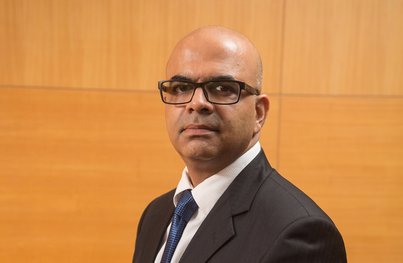In the long term markets will eventually reflect the inherent strength and value of the businesses
BFSI Industry Interview

Mr. Gaurav Misra is a Sr. Fund Manager of Mirae Asset Focused Fund and co-fund manager of Mirae Asset Large Cap Fund along with Mr. Harshad Borawake since 31st January, 2019. Prior to joining Mirae Asset Mutual Fund, he was associated with ASK Investment Managers Pvt. Ltd. for 14 years.
Mr. Gaurav is an MBA from IIM Lucknow and BA Economics (Hons.) from St. Stephen’s College, Delhi. He has a rich experience of over 23 years in Institutional and Private Equity.
Large parts of the world are under total or partial lockdown due to Coronavirus and economic activity severely affected. What are your views on the short term and long term global impact of Coronavirus?
Irrespective of the time horizon, the impact of Coronavirus will depend on a few things
- The time lines on how successfully respective governments are able to contain its spread and the development of drugs and vaccines
- The efficacy and optimality of various monetary and fiscal measures announced by major countries.
Depending on the country, in the short term there is a partial/complete cessation of activities barring a few sectors such as agriculture, government administration/healthcare, utilities, telecom/internet, etc. This will lead to a sharp contraction of near term(3-4 quarters) GDP and pull down corporate revenues and earnings as well. All this and possibly more has already been discounted by the markets.
The G20 has committed over USD 5 trillion (or over 6% of global GDP) as fiscal support in assorted ways (sector specific and broad based). Additionally there is lots of monetary easing and forbearance which has been announced. Thus short term liquidity issues at the macro level should be taken care off.What is unknown and uncertain at this point is how effectively all these measures can prevent credit issues, bankruptcies and layoffs.
If we assume that the government monetary/fiscal measures are by and large successful and that the covid -19 pandemic is controlled in a reasonable period, there could a healthy recovery in the long term. Additionally there could a change in consumer behaviour and there could be an increasing trend towards greater sourcing from countries beyond China.
The Indian economy was already in a slowdown before the lockdown. What will be short term and long term impact of Coronavirus on the Indian economy?
India was emerging from a combination of cyclical and structural slow down. Sectors such as real estate are to emerge from a structural transformation post demonetisation and RERA, while the banking sector was emerging from asset quality issues. The auto sector was in a cyclical downturn for over 4 quarters and expected to turnaround during the year. In a way the starting point for India is advantageous. We are coming from a low base of overall activity and the coronavirus is an external shock to the Indian system. Since the cause of the problem is external to India and it is not a structural problem or one of our own making, one can be hopeful that recovery could be fast as well. However given the novel nature of the virus, the pandemic problem could persist/spread for longer. In that scenario the recovery as and when it starts will be slower and gradual.
In the short term clearly, like the rest of the world, there will be a de growth in GDP and corporate earnings. In the short term there will be a bearing on consumer confidence. In the short period it is important that the supply shock is minimised by ensuring that supply and production chains across essential goods (including farming activity) and other segments (when opened up) are intact and functioning, otherwise problems will get amplified.
Long term impacts might mirror the rest of the world in terms of faster adaption of online shopping, higher levels of WFH, online learning, etc. Additionally there could be a strengthening of the country’s medical infrastructure and capacity. There could more FDI in select industries as an alternate manufacturing hub to the world. Ultimately, the country will retain its structural demographic advantage. With low cost of money globally and various reforms carried out in the past, India should be able to attract external capital. All this along with improving infrastructure and technology should suggest a healthy growth outlook in the long term.
What is your outlook on the Indian equities markets in the short and long term?
The short term is expected to be fairly volatile. Global flows will determine this volatility. The global flows in turn are being determined more by factors such as fear. “In the short term the markets are a voting machine but in the long term a weighing machine”. In the long term markets will eventually reflect the inherent strength and value of the businesses comprising the market. The value of the business is the summation of the discounted free cash they will generate over their life span. A few quarters of impairment will not alter that significantly. Thus in the long term I am very constructive on the outlook for India equities.
The Nifty has fallen more than 30% this year (as on 1st April). Are large caps attractive from a valuation viewpoint now?
In aggregate, valuations on all parameters are at a very attractive level for the large cap and the market overall. The market cap to GDP is now at a level it was during the Global Financial Crisis of 2008-9. Historically, Indian markets have been found at the current valuation range only about 5% of the time. The bond and earnings yield gap is also at a maximum post the GFC. These are attractive entry levels for an investor looking for absolute/relative returns. Of course, the markets can correct more but I cannot predict that. On the other hand in periods of uncertainty and weak economic cues – strong well run businesses tend to be more immune and gain market share at the cost of weaker firms. Many of such stronger businesses are found in the large cap segment.
What is the investment strategy in Mirae Asset Large Cap Fund?
As the name suggests, atleast 80% of our investments are in large cap firms. Our strategy is to select firms which meet our criterion of quality of business (measured over long periods of time), quality of management (including capital allocation, dividend distribution policy, etc) and growth outlook at the best margin of safety. While constructing the portfolio we also keep some weight for otherwise good businesses which are in a turnaround, cyclical downturn or some other special situation. We do not take cash calls.
This scheme has historically a very strong performance track record. It has been a year since this scheme became a large cap fund from a multi-cap fund. Apart from the market cap mandate has there been any other change in the way in which you are managing the fund?
Even prior to the re categorisation the fund was at a +75% large cap weight for the preceding 4-5 years. After the SEBI categorization the fund has been run as a large cap one with over 80% in the large cap segment. The underlying approach to stock selection remains the same. Similarly except for minor changesthe portfolio construction approach remains similar.
Should investors use the correction in stocks to increase their exposure to equity? What is your general guidance to investors?
For all the reasons above, I think investors should refresh their asset allocation in the current times. If they are unallocated/under allocated to equity, given risk profile, this is a wonderful opportunity to correct that imbalance.
Mutual Fund Investments are subject to market risk, read all scheme related documents carefully.
Recent Interviews
-
Partner Connect by Advisorkhoj with Mr Amit Kalra Glorious Path Pvt Ltd New Delhi
Dec 5, 2025
-
Partner Connect by Advisorkhoj with Mr Alok Dubey PrimeWealth Pune
Dec 1, 2025
-
In Conversation by Advisorkhoj with Ms Aparna Shanker Chief Investment Officer Equity The Wealth Company Mutual Fund
Nov 28, 2025
-
In Conversation by Advisorkhoj with Mr Sanjay Bembalkar Head Equity Union MF
Nov 28, 2025
-
In Conversation by Advisorkhoj with Mr Arjun Khanna Equity Fund Manager Kotak Mutual Fund
Nov 17, 2025
Fund News
-
Mr. Navneet Munot's 'Person of the Year 2025'
Dec 31, 2025 by HDFC Mutual Fund
-
Zerodha Mutual Fund launches Zerodha Nifty Short Duration G Sec Index Fund
Dec 26, 2025 by Advisorkhoj Team
-
Groww Mutual Fund launches Groww Nifty Chemicals ETF
Dec 26, 2025 by Advisorkhoj Team
-
DSP Mutual Fund launches DSP Nifty Next 50 ETF
Dec 19, 2025 by Advisorkhoj Team
-
DSP Mutual Fund launches DSP Nifty 500 Index Fund
Dec 19, 2025 by Advisorkhoj Team





